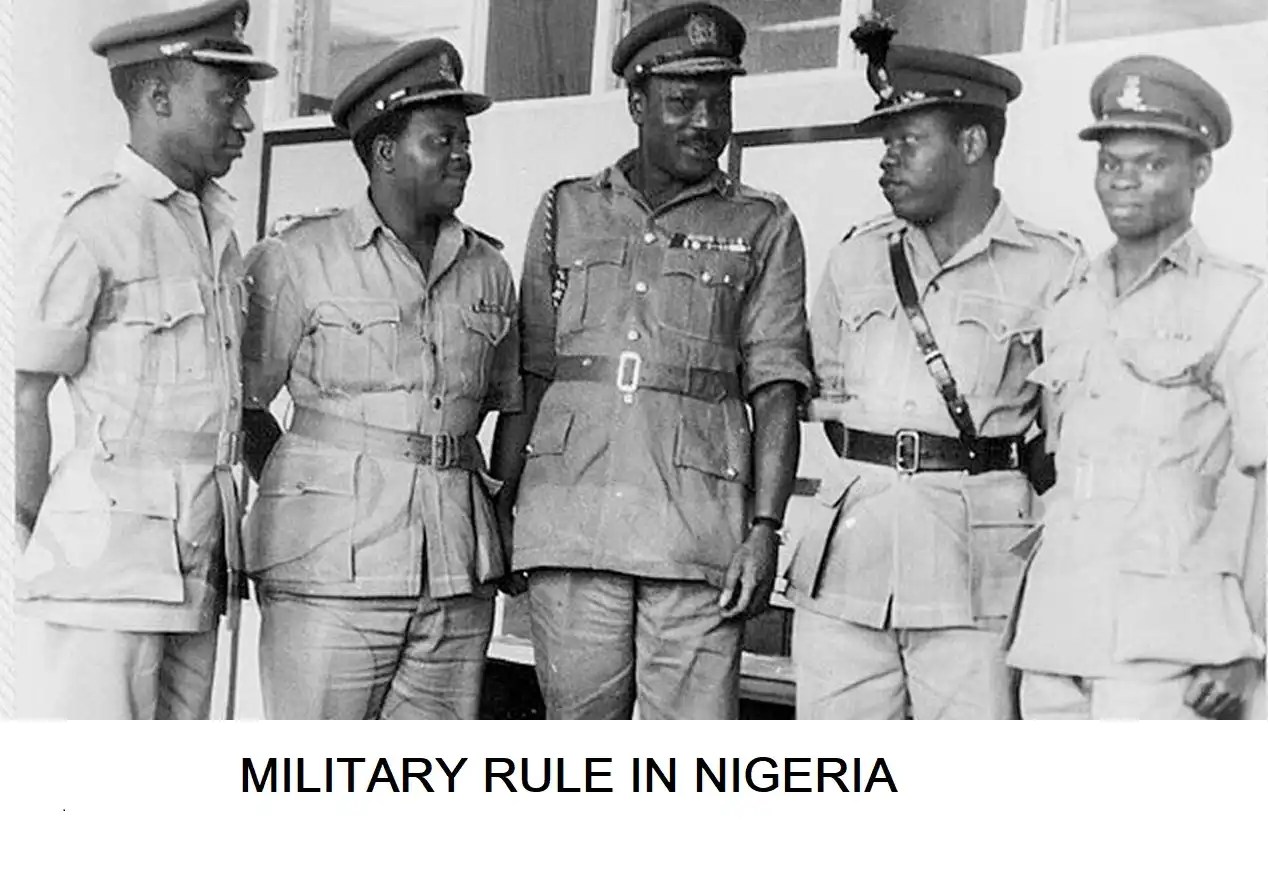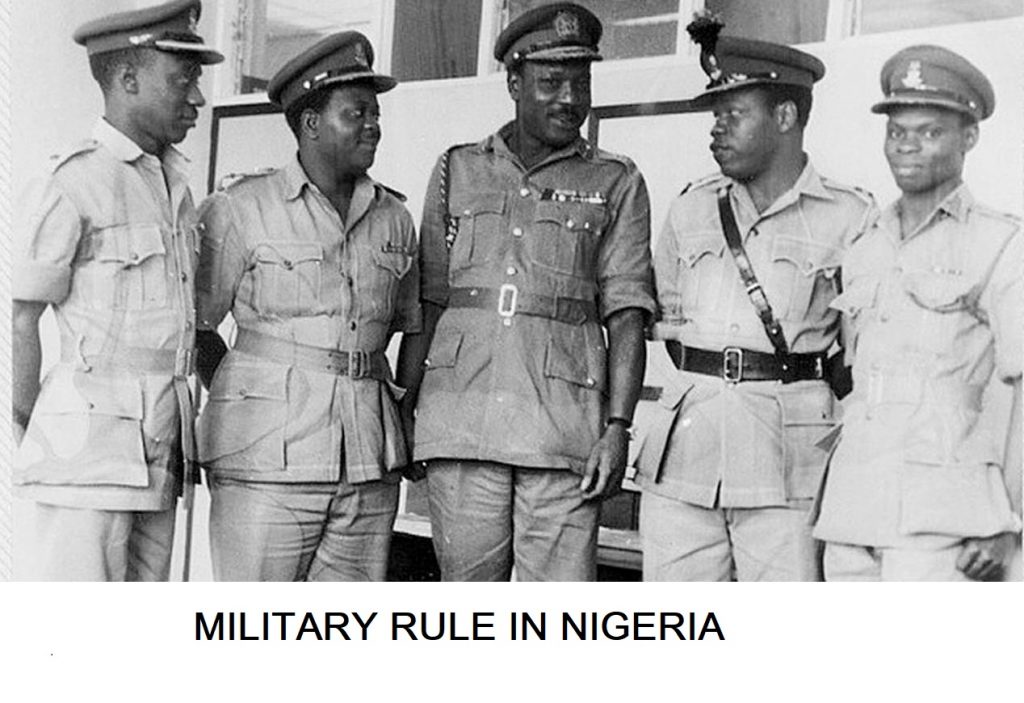
In the early hours of January 15th 1966, Nigeria witnessed the first military coup led by Major Chukwuma Nzeogwu and other Majors in the army. This marked the beginning of Military rule in Nigeria after the colonial administration in Nigeria. It was a bloody military intervention in the political history of Nigeria. Some key political leaders like the Prime Minister, Sir Abubakar Tafawa Balewa, S.L Akintola, Premier of Western region, the minister of finance, Chief Okotie Eboh, Sir Ahmadu Bello, Premier of Northern region and many all the top ranking officers in the armed forces were killed.
Later, Major-General Aguiyi Ironsi, came into the scene to take the mantle of leadership of the country. His tenure balls however short-lived as a counter-coup was staged on the 29th of July 1966 and Aguiyi Oronsi was toppled and killed and Lt. Colonel Yakubu Gowon took over the political leadership of the country. General Yakubu Gowon spent nine years in office and was removed by Brigadier Murtala Mohammed.
Also, after spending just 200 days in office, Murtala Mohammed was assassinated in an abortive coup led by lieutenant Colonel Dimka on the 13th of February, 1976. General Olusegun Obasanjo the next in command to Murtala Muhammed, became the head of state. It was at this time that the military keep it promise of handing over power to a democratically elected civilian government (1979 – 1983 Second Republic). However, the civilian government was going for his second term in office when major general Mohammed Buhari through a military coup sacked the democratically elected government.
On the 27th of August 1985, major general Muhammad Buhari was ousted from power through what was referred described as a Palace coup d’état by major general Ibrahim Babangida and he subsequently made himself the president of Nigeria, abandoning the title of the ‘Head of State’. An unsuccessful coup attempt was staged against Babangida by Major Gideon Orkar led military coup on April 22nd 1990.
In December 1985, there was also a vasta coup attempt during Babangida’s regime. Babangida retired from the army after stepping aside in 1993. He had earlier set up an interim government headed by chief Ernest shonekan as the head of state, Lieutenant General Abacha sacks the interim government and assumed the new military head of state of Nigeria. Abacha died on the 8th of June 1998 and was succeeded by General Abdulsalami Abubakar.

The Structure of Military Rule in Nigeria From 1985 – 1993
1) The Armed Forces Ruling Council:
This was the supreme body which performed legislative functions. this was composed of the service chiefs top ranking military officers, the Inspector General of police, Attorney general of the federation with the president of Nigeria as the chairman.
2) The Council of Ministers:
It what’s composed of the president Vice President and the ministers some of whom are military officers while others were civilians. The council performed executive functions with the president as chairman.
3) The National Council of States:
It is composed of the head of state/President, chief of general staff minister of defense service chiefs of the army the navy and the air Force including the inspector general of police.
Functions of the Supreme Military Council
The Council was charged with recognition and harmonization of the work of the various state governments and the federal military government. Former heads of state also members.
The Judiciary: It remind the same in the civilian error with chief justice as a head. inclusive of various terminals which had judges and military officers as members.
The Civil Service: The secretary to the military government is head of public services. The DGs (Director Generals) replaced the permanent secretaries by the 1988 civil service reforms.
10 Benefits and Achievements of Military Rule In Nigeria
The military rule in Nigeria brought about some notable and significant development in Nigeria today. Do you know that 80% of the major edifice, flyovers and other structures in Nigeria were built during the military administration in Nigeria. Below are some of the notable achievements during the era of military rule in Nigeria which are still being enjoyed by citizens till today.
a) Infrastructural Development: The military regime in Nigeria brought about the construction of major roads linking various states in the 6 geopolitical regions in Nigeria. Airports were built, major Bridges and flyovers as well as educational institutions, iron and steel industries, textile and cotton Industries were also established.
b) Prevented Nigeria’s Break-up: The intervention of the military prevented the breaking up of Nigeria. At that time, the Igbos were already championing the idea of splitting. The late Chief Odimegwu Ojukwu was top ranking military officer spearheading this cause as as a result of the tribalism going on in the military as the Igbos in the military were being played and sidelined. The then military head of states, General Yakubu Gowon fought the Biafran soldiers who were already fighting the federal troops in a bid to breakout from Nigeria.
c) Creation of States: The military succeeded in creation of states and local government councils. Example trust States were created out of the former for regions on May 27th 1967 19 States subsequently created and the 3rd of February 1976 by the Murtala Muhammad administration. Our detailed post on the creation of states and their capitals has more info about the list of states created by the Military regime in Nigeria.
d) Encouragement of Regional Cooperation Among West African Nations: One of the notable achievements of the military rule in Nigeria was the encouragement of regional cooperation amongst west African countries for example General Yakubu Gowon was one of the founding fathers of ECOWAS (Economic Community of West African states). We can notably classify ECOWAS as one of the achievements of Military rule in Nigeria.
e) Nigerian Foreign Policy: During the military era, there was high rate of Colonialism still going on after Nigeria gained her independence. The military brought about a positive change in the Nigerian foreign policy by by leading the struggle against apartheid and colonialism thereby making Nigeria a frontline state.
f) Promotion of National Integration: Though many have been calling for the scrapping of the National Youth Service Corps scheme owing to the fact that it has long outlived its purpose and usefulness. However, the truth remains that the scheme still has roles to play especially in the development and enlightenment of the rural areas most especially. The NYSC Federal government schools, quota system, and so on where established to promote national integration. The national youth Service corps is one of the programs established in 1973 me to bring about national integration. The youths, after their university education, were moved to different parts of the country in order to promote a better understanding of one another culturally, socially and politically.
g) Educational Funding: Education took a giant stride during the military rule in Nigeria. Many federal and state universities, polytechnics, colleges of education and other special technical schools where set up. The federal military government also took over the funding of primary education in the country. Currently the number of pupils admitted into government primary and secondary schools have increased tremendously.
h) Change in Driving Pattern: The introduction military rule in Nigeria brought about a change in the pattern of driving on the 2nd of April 1972. That is, Nigeria changed from driving on the left-hand side to the right hand side. Note that before Nigeria gained independence left hand drive cars were being used by the British colonial Masters while the RHD cars were used by the French colonial Masters. Taking into account of the fact that majority of the western African countries sharing borders with Nigeria were francophone countries except Nigeria, Ghana, Sierra-leone and Zambia, the rest were dominated by France hence the need for LHD (Left hand drive) cars was more pronounced most especially for economic reasons. This is one of the military rule in Nigeria.
i) New Capital Territory: the military administration of Motorola and Obasanjo created a new capital Territory for the country. Abuja overtook from Lagos as the new federal capital Territory.
j) New Constitution: This was promulgated based on a presidential system of government in 1979. it was the constitution that ushered in the second Republic in Nigeria.
10 Reasons Military Rule In Nigeria Underachieved
1) Incompetence and Inexperience: the military regime was constituted by military personnel who lacked both administrative and political experience to govern Nigeria as a nation. The area of expertise listen the use of arms and protection of Nigeria as a sovereign nation. Dabbling into politics through forceful take over spelt doom for Nigerian politics.
2) Non-tolerance to Criticisms: The military regime did not tolerate criticism and therefore hostile to criticisms and critical of public hence freedom of speech was trampled upon.
3) Dictatorship: All military administration dictatorship. They rule by decrees and edicts that may not be challenged in any court of law.
4) Independence of the Judiciary: The independence of the judiciary was sometimes not guaranteed and many of the decrees contain ouster clauses that render judiciary powerless.
5) The Nigerian Civil War: The military rule in Nigeria was responsible for the civil war that claimed millions of lives. The war lasted for 3 years (1967 to 1970).
6) Corruption: the military regime in Nigeria was bedeviled by corruption. There was widespread corruption among those in the corridors of power. Many of these military men acquire their ill-gotten wealth with impunity. Ironically the same reason given for forceful take over from civilian government, labelled as ‘corruption and instability in the polity’ was the same act they were found wanting.
7) Mismanagement and Wastage of Public Funds: The military mismanaged and wasted the public funds through massive importation of cement fuel and rice. During the discovery of oil, General Yakubu Gowon publicly stated that Nigeria had so much money and they didn’t know what to do with it. It was then various elephant projects like Festac 77, National Theater and other white elephant projects were built. There was mass spending and mismanagement of funds during that era.
8) Public Violation of Human Rights: The military rule in Nigeria was noted for violating of the fundamental human rights of common citizens. People were detained without trial. The death of Ken Sarowiwa and other eight Ogoni citizens is a case in point. After the death sentence was handed down, they were not given the opportunity to appeal. The outcome was globally condemned by NGOs and other world leaders and this was further greeted by suspension of Nigeria from the Commonwealth and sanctions from countries and international organizations imposed on Nigeria.
9) No Respect for The Rule of Law: Since the military rule is conducted without the constitution it automatically lacks respect for the rule of law. Laws are made through issuing of decrees. Most of these decrees were made by a few that imposed on the majority of Nigerians. Nobody dared to question relevance of these decrees.
10) Lack of Census Programme: This has been one of the failures of the military administration in Nigeria. The failure to conduct a reliable and acceptable census in the country has brought doubt in the minds of most Nigerians about the sincerity of the military on issues of National questions.
Military Rule in Nigeria in Nigeria had its merits and demerits, however, no matter how many the merits are, it is not to say military rule is good because its all about absolute power which absolutely corrupts. Plus it takes the power of the electorates off them.


